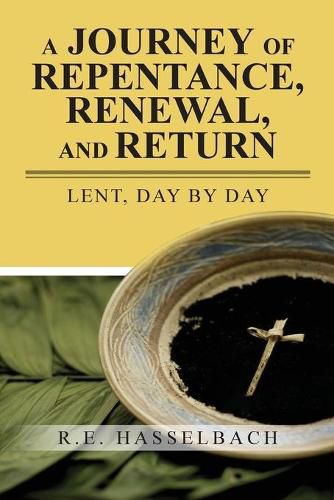Readings Newsletter
Become a Readings Member to make your shopping experience even easier.
Sign in or sign up for free!
You’re not far away from qualifying for FREE standard shipping within Australia
You’ve qualified for FREE standard shipping within Australia
The cart is loading…






This title is printed to order. This book may have been self-published. If so, we cannot guarantee the quality of the content. In the main most books will have gone through the editing process however some may not. We therefore suggest that you be aware of this before ordering this book. If in doubt check either the author or publisher’s details as we are unable to accept any returns unless they are faulty. Please contact us if you have any questions.
In this nonfiction debut, Hasselbach takes readers through the liturgical celebration of Lent, which stretches from Ash Wednesday to Easter Sunday. The period is typically seen by Christian celebrants as a time of reflection and personal denial- What are you giving up for Lent? is the typical question. The author takes a broad and scripturally informed view of the subject, issuing a call to action to Christian readers: First, we must do a fiercely honest examination of our lives-before we repent, we must know we are sinners. The book breaks down Lent by day, with each section providing plenty of space for readers to write their own reflections. This is a work that can be used extensively by readers, shaped to their own personal interpretations of the season. The volume’s strongest feature by far is Hasselbach’s own insights into not only Lent specifically, but also the Christian faith more generally. If Jesus’s resurrection was for him alone, it would be amazing but not significant for us all these years later, one passage goes. It would have changed him, but not us.
When Jesus tells us to become like little children, he is instructing us to acknowledge that we are one with the poor, the suffering, the broken, and the lost, reads another. That means we must accept those whom others reject. These and other observations about the nature of Christianity crop up throughout the book and are uniformly intriguing. Even readers who have little interest in performing an active Lent will still find the bulk of this work invigoratingly thought-provoking. And the volume’s usefulness during Lent itself is self-evident.
$9.00 standard shipping within Australia
FREE standard shipping within Australia for orders over $100.00
Express & International shipping calculated at checkout
This title is printed to order. This book may have been self-published. If so, we cannot guarantee the quality of the content. In the main most books will have gone through the editing process however some may not. We therefore suggest that you be aware of this before ordering this book. If in doubt check either the author or publisher’s details as we are unable to accept any returns unless they are faulty. Please contact us if you have any questions.
In this nonfiction debut, Hasselbach takes readers through the liturgical celebration of Lent, which stretches from Ash Wednesday to Easter Sunday. The period is typically seen by Christian celebrants as a time of reflection and personal denial- What are you giving up for Lent? is the typical question. The author takes a broad and scripturally informed view of the subject, issuing a call to action to Christian readers: First, we must do a fiercely honest examination of our lives-before we repent, we must know we are sinners. The book breaks down Lent by day, with each section providing plenty of space for readers to write their own reflections. This is a work that can be used extensively by readers, shaped to their own personal interpretations of the season. The volume’s strongest feature by far is Hasselbach’s own insights into not only Lent specifically, but also the Christian faith more generally. If Jesus’s resurrection was for him alone, it would be amazing but not significant for us all these years later, one passage goes. It would have changed him, but not us.
When Jesus tells us to become like little children, he is instructing us to acknowledge that we are one with the poor, the suffering, the broken, and the lost, reads another. That means we must accept those whom others reject. These and other observations about the nature of Christianity crop up throughout the book and are uniformly intriguing. Even readers who have little interest in performing an active Lent will still find the bulk of this work invigoratingly thought-provoking. And the volume’s usefulness during Lent itself is self-evident.